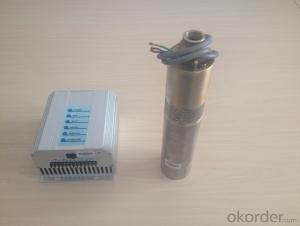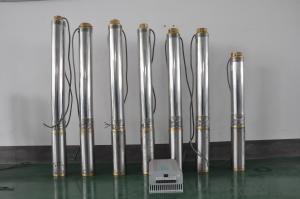DC Solar Submersible Water Pumps
- Loading Port:
- China Main Port
- Payment Terms:
- TT OR LC
- Min Order Qty:
- -
- Supply Capability:
- -
OKorder Service Pledge
OKorder Financial Service
You Might Also Like
Item Description :
This superb new addition to our solar fountain range comes with a 10w solar panel,and a powerful fountain pump that is capable of producing fountains of up to 2m in height. As well as being easy to set up and use.Instruction manual is supplied for assembly and maintenance.
Solar Fountain Key Features :
Powered by direct sunlight
No high voltage electric mains required
Safe for children
Max. height of fountain: 2M
Max. flow capacity: 800 L/H(176 GAL)
10W Polycrystalline solar panel included
18V DC brushless pump
Solar Pump Features :
Can produce fountains up to : 2M (tube height) 1.4M (fountain height)
Comes with multiple nozzle accessories
Cable Length : 5M
Solar Panel Features :
10W peak power.
Polycrystalline highly efficient solar panel
Comes mounted in aluminium frame
Comes with ground stake and rotating knob so you can angle your panel toward the sun
What You Will Get :
10W solar panel
Solar pump
Ground Sake
Nozzle accessories
Precautions :
DO NOT alter or change the product itself or its components
Operate pump in freshwater only, never above 50 degrees celsius
Keep away from flammable liquids
Do not connect to any other power supply other than the included
- Q:How does a solar pump compare to a diesel-powered pump?
- A solar pump is generally more environmentally-friendly and cost-effective compared to a diesel-powered pump. Solar pumps utilize renewable energy from the sun, resulting in zero greenhouse gas emissions and lower operational costs over time. In contrast, diesel-powered pumps rely on non-renewable fossil fuels, emitting pollutants and contributing to air pollution. Additionally, solar pumps have lower maintenance requirements and can provide a reliable water supply in remote areas where diesel fuel may be scarce or expensive.
- Q:Can a solar pump be used for water supply in remote cabins or cottages?
- Certainly, the utilization of a solar pump for water provision in secluded cabins or cottages is indeed possible. Solar pumps are specifically designed to harness the sun's energy in order to extract water from wells, rivers, or lakes, thereby making them an exceptional choice for locations that are off the grid. These pumps are not only dependable and energy-efficient, but they also offer a sustainable water supply without the necessity of electricity or fuel. With their diverse range of sizes and capacities, solar pumps can effectively cater to the unique water requirements of cabins or cottages. In addition, they necessitate minimal maintenance and boast an extended lifespan, rendering them an ideal solution for remote areas where regular upkeep may be challenging. All in all, a solar pump presents a pragmatic and environmentally conscious alternative for ensuring a reliable water supply in remote cabins or cottages.
- Q:Can a solar pump be used for water supply in commercial buildings or complexes?
- Yes, a solar pump can be used for water supply in commercial buildings or complexes. Solar pumps are commonly used for various applications including irrigation, livestock watering, and domestic water supply. They are a sustainable and cost-effective solution, as they utilize solar energy to power the pump, reducing dependency on conventional electricity sources. With advancements in technology, solar pumps can provide sufficient water supply for the requirements of commercial buildings or complexes, making them a viable option for sustainable water management.
- Q:How does the cleanliness of the solar panels affect the performance of a solar pump system?
- The cleanliness of solar panels directly affects the performance of a solar pump system. Dust, dirt, or debris accumulated on the surface of the panels can block sunlight, reducing the amount of energy they can absorb and convert into electricity. This decrease in energy production can result in a decrease in the overall efficiency and output of the solar pump system. Therefore, ensuring the cleanliness of solar panels is essential for maintaining optimal performance and maximizing the system's efficiency.
- Q:Are there any limitations on the distance a solar pump can pump water?
- Yes, there are limitations on the distance a solar pump can pump water. The maximum distance a solar pump can pump water depends on various factors such as the power of the pump, the elevation difference between the water source and the destination, the diameter and material of the pipes used, and the efficiency of the pump. Generally, solar pumps are capable of pumping water over distances ranging from a few hundred meters to several kilometers, but beyond a certain point, the water pressure and flow rate may decrease, impacting the effectiveness of the pump. Additionally, longer distances may require more powerful and expensive solar pumps to maintain sufficient water pressure.
- Q:How does the voltage of the solar pump system affect its performance?
- The voltage of the solar pump system directly affects its performance. Higher voltage can increase the pump's efficiency and flow rate, allowing it to operate more effectively. Conversely, lower voltage can result in reduced performance, slower pumping, and a decrease in overall effectiveness of the system. Therefore, the voltage of the solar pump system plays a crucial role in determining its performance.
- Q:How does a solar pump handle water with high levels of heavy metals or radioactive materials?
- A solar pump itself does not have the capability to handle water with high levels of heavy metals or radioactive materials. The primary function of a solar pump is to draw and pump water using solar energy. To handle water contaminated with high levels of heavy metals or radioactive materials, additional steps and technologies such as filtration, sedimentation, or reverse osmosis systems would need to be incorporated into the water treatment process. These additional measures are necessary to remove or reduce the concentration of such contaminants, ensuring safe and clean water for various purposes.
- Q:Can a solar pump be used in areas with strict building codes or regulations?
- Yes, a solar pump can be used in areas with strict building codes or regulations. Solar pumps are typically considered low impact and environmentally friendly, which can make them compliant with building codes and regulations. However, it is important to check with local authorities to ensure that the specific solar pump installation adheres to all applicable rules and regulations.
- Q:How does the efficiency of a solar pump compare to traditional electric pumps?
- Solar pumps are generally considered to be more efficient than traditional electric pumps. They work by utilizing photovoltaic (PV) panels to convert sunlight into electricity, which then powers the pump. This renewable energy source eliminates the need for grid electricity, resulting in reduced operating costs and a smaller environmental footprint. One significant advantage of solar pumps is their ability to function independently of the power grid, making them suitable for remote and off-grid locations. Unlike traditional electric pumps, which rely on a constant supply of grid electricity that can sometimes be unreliable in certain areas, solar pumps provide a consistent and reliable water supply, especially in regions with ample sunlight. In addition, solar pumps have a longer lifespan and require less maintenance compared to traditional electric pumps. The absence of fuel or moving parts in solar pumps reduces the risk of breakdowns and eliminates the need for regular servicing. Consequently, this leads to lower maintenance costs and increased reliability, making solar pumps a cost-effective long-term investment. Moreover, solar pumps are environmentally friendly as they produce zero greenhouse gas emissions during operation. In contrast, traditional electric pumps rely on electricity generated from fossil fuels, contributing to carbon emissions and pollution. By harnessing the power of the sun, solar pumps promote sustainable and clean energy solutions. Although solar pumps are generally more efficient, their performance can vary depending on factors such as sunlight availability, pump size, and water demand. It is crucial to properly size and design a solar pump system to meet the specific requirements of the application in order to achieve optimal efficiency. In conclusion, solar pumps are generally more efficient than traditional electric pumps. They offer a range of benefits, including independence from the power grid, cost savings, reduced maintenance, and environmentally friendly operation.
- Q:Can a solar pump be used in areas with high electricity costs?
- Yes, a solar pump can be effectively used in areas with high electricity costs. Since solar pumps operate using solar energy, they can significantly reduce or eliminate the need for grid electricity, thereby helping to save on electricity costs. Additionally, solar pumps have lower maintenance requirements compared to traditional pumps, making them a cost-effective alternative in areas with high electricity expenses.
1. Manufacturer Overview |
|
|---|---|
| Location | |
| Year Established | |
| Annual Output Value | |
| Main Markets | |
| Company Certifications | |
2. Manufacturer Certificates |
|
|---|---|
| a) Certification Name | |
| Range | |
| Reference | |
| Validity Period | |
3. Manufacturer Capability |
|
|---|---|
| a)Trade Capacity | |
| Nearest Port | |
| Export Percentage | |
| No.of Employees in Trade Department | |
| Language Spoken: | |
| b)Factory Information | |
| Factory Size: | |
| No. of Production Lines | |
| Contract Manufacturing | |
| Product Price Range | |
Send your message to us
DC Solar Submersible Water Pumps
- Loading Port:
- China Main Port
- Payment Terms:
- TT OR LC
- Min Order Qty:
- -
- Supply Capability:
- -
OKorder Service Pledge
OKorder Financial Service
Similar products
New products
Hot products
Hot Searches
Related keywords



























